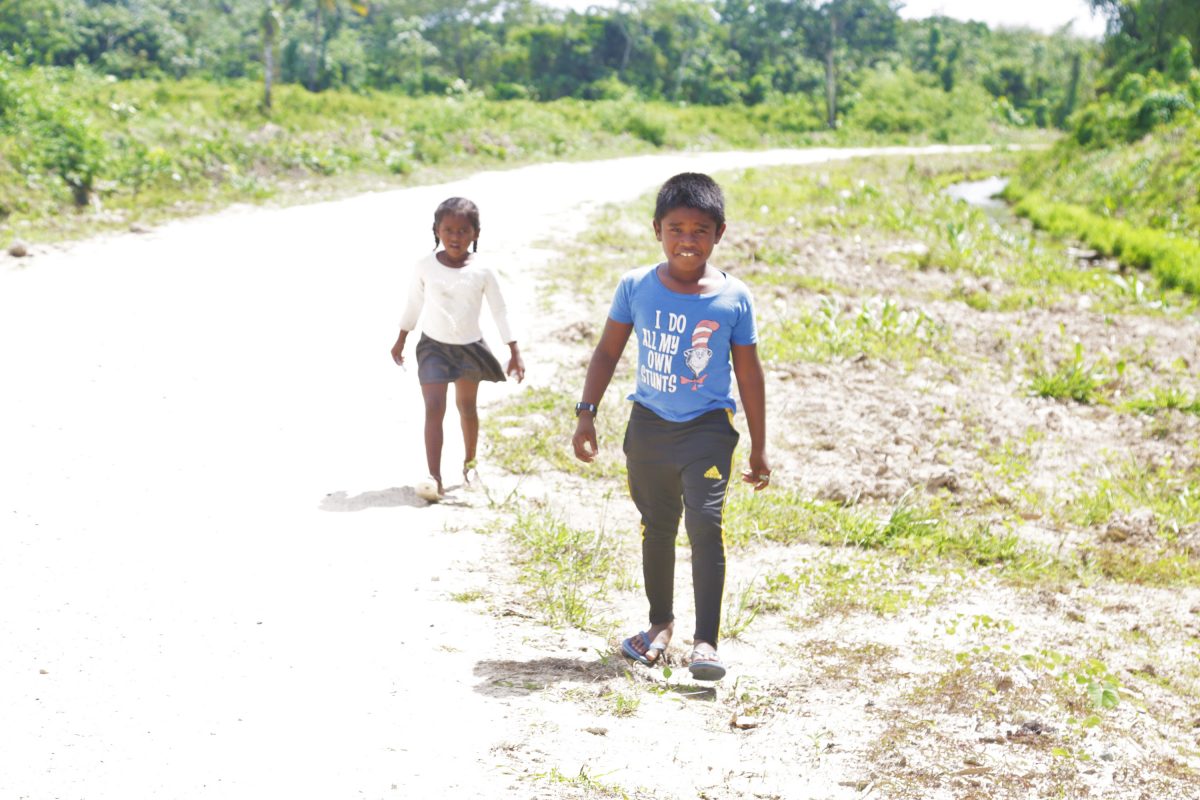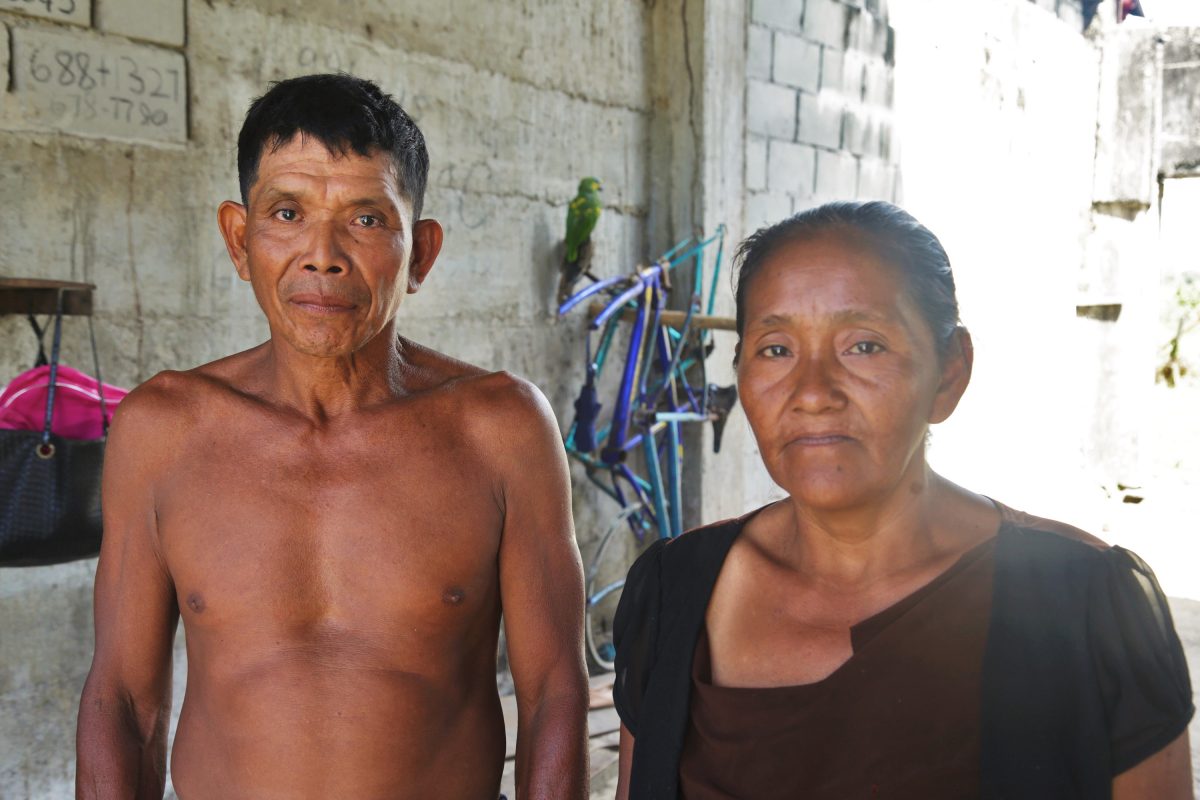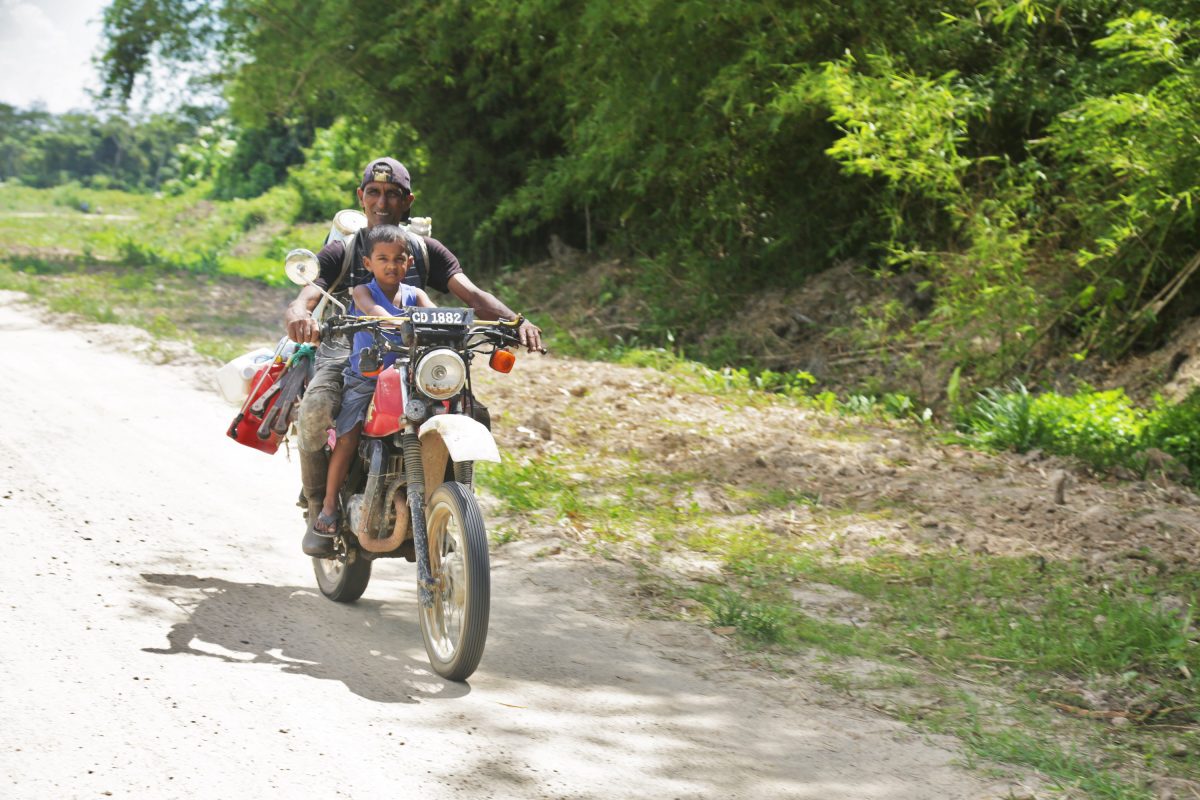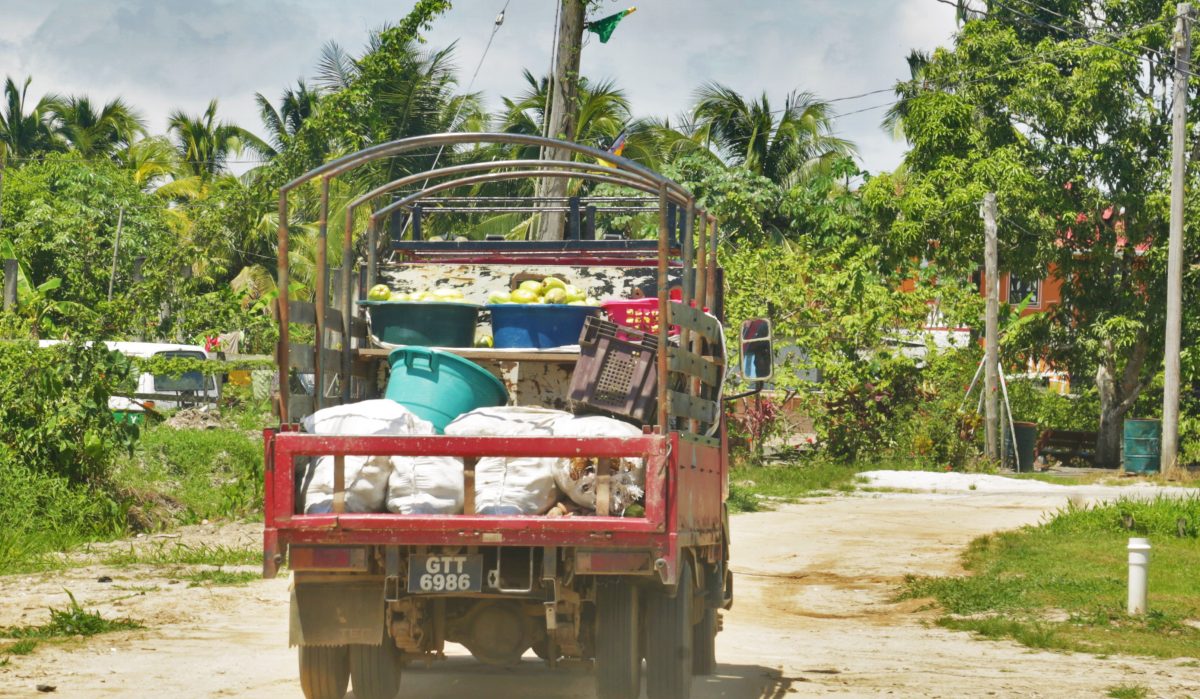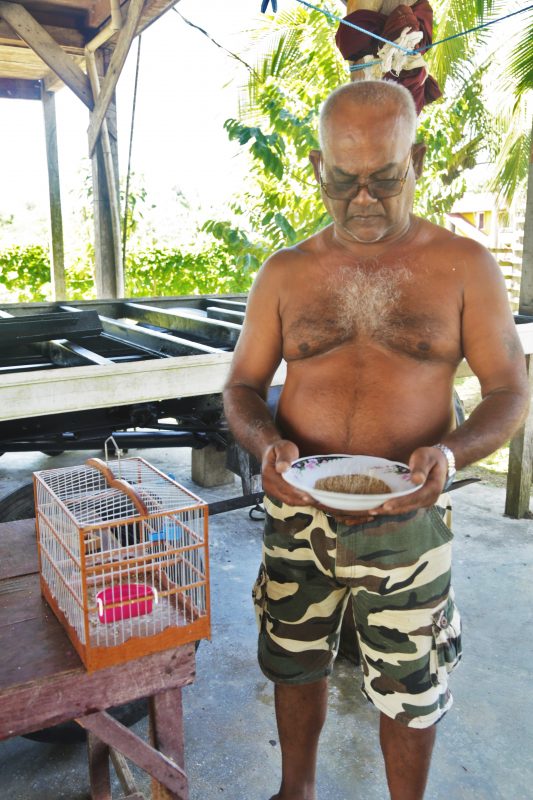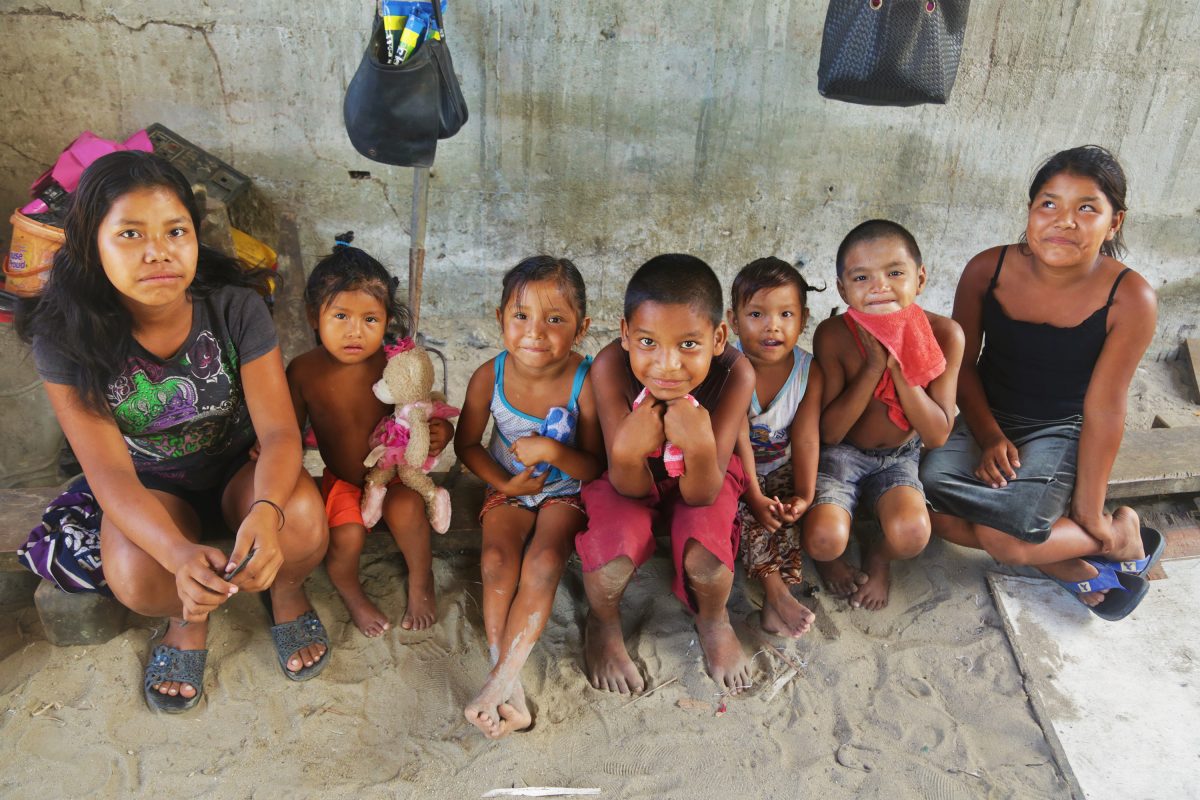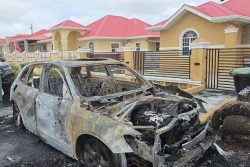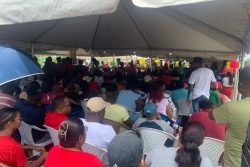Larimakabra is a community of 18 people – a shopkeeper who lives by himself and the 17-member Williams family– located along the Parika-Hubu Road, between Naamless and Bendoroff, on the East Bank of Essequibo.
No one knows how old the village is but it was said that people had settled here in the early 1900s.
Only the first resident in Larimakabra has electricity and potable water since he lives only a lot away from the populated village of Naamless. For the others, their only source of electricity is either using solar panels or a generator and they store rainwater to drink and cook. The nearby canals and the Essequibo River provide water for bathing, laundry, doing dishes, and irrigating kitchen gardens and farms.
Shopkeeper Nizam Mohamed carefully cleaned the three bird cages nearby and refilled the almost empty bird boxes. He has six birds and said they keep him his company since he lives alone. Originally from Siriki, Pomeroon, Mohamed migrated from the countryside and spent most of his life in Georgetown but moved to Larimakabra recently to live at a property that belongs to a 90-plus-year-old relative residing in the city. The man shared that his earlier adult life saw him working as a goldsmith, after which he worked in the gold mines. He now runs a grocery business that serves the other residents of Larimakabra, and residents of Naamless, Bendorff and Morasi, though many of these people do most of their shopping at Parika Market.
His shop is restocked on weekends whenever necessary by his son-in-law, who resides in Georgetown but spends his weekends in Larimakabra tending the family farm, including animals. Sometimes Mohamed travels to Parika to buy meat or cigarettes to sell or to pay bills.
The man noted that although it is nice to live in Larimakabra he has suffered losses. During the Christmas season he stayed with relatives in the city and on his return his ducks had gone missing. According to what he heard some time after, they were taken by someone from nearby Naamless. Another time, he lost several head of cattle. His uncle, the owner of the property, he said, had similar experiences in previous times.
He has also suffered through extending credit for groceries and not being paid. Mohamed said this was mostly due to strangers in the area who went to work on the farms and said they would pay as they earned, but in the end left with huge balances owed. He has since stopped extending credit to anyone who is not from the area.
With the family having acquired acres of land for farming, Mohamed shared that some time last year he had the trees cut down on a large plot of land also belonging to his uncle and asked people to help him remove the remaining stumps so that it could be used as a playground. However, he said, no one cared, and one man actually told him, ‘If people go and help deh, he got to get the transport [land title]’. Mohamed said the bush has since grown back and he does not plan on making such an effort again.
He continued tending to his birds, putting a white chalk-like substance in the smaller compartment of the bird’s feeder. He said he had made it himself using the shell membrane that covers eggs. After boiling eggs for himself, he removes the shell membrane (a transparent veil that coats the egg white) and leaves it to cool in water. It is then dried and becomes the chalky substance, which, according to him, takes care of the birds’ beaks.
Caretakers
Up ahead in the distance, I could barely make out two little children walking through some cassava plants, each carrying a pumpkin atop their heads. Their mother, Selene Williams, was inside cutting a piece of plywood with a hand saw. Nearby, in an aluminium basin, was chopped up pumpkin that was to be prepared for lunch. A mother of 11, with ten children alive today, Williams shares her home with all of her children, daughter-in-law and grandchildren, two of whom are from her daughter who she said died mysteriously. Altogether, 17 people live in the two-storey house; the Williamses are the caretakers and they depend on farming for their sustenance.
The mother and father and some of their children moved to Larimakabra from the North West District, where they lived in the riverain areas in the Mabaruma sub-district. Williams said when she left Region One, she was pregnant. This was a little more than a decade ago. The woman said she was told she needed to attend clinic at the Georgetown Public Hospital as her case was considered high risk owing to her being in her mid-thirties. She had intended to return home after her baby was delivered, but then her husband travelled to Georgetown to see her. Her children followed and the family never returned; she later had several more children. They have been living in Larimakabra for more than a year having moved from Morasi, two villages away, where they had settled for nine years.
“Sometime ah does seh leh we guh back we village [in the North West] but you see we nah get the passage money. Ah got six sons [mostly teenagers] who working in the backdam with them father. I does fall in on one, one wuk to,” she said. “When we working day wuk, we does get pay $3,000 a man but when we working job wuk, we does work sometimes fuh $6,000 or $10,000. The money not plenty. But ah does plant up the yard, so we does always got lil thing to eat instead of got to buy.”
The woman further said that things got harder after her daughter passed away, leaving her with two grandsons to take care of, the younger being eight months old at the time. Their father, she said, chose not to help out and everything was left to her. Asked how much it would cost to go back, the woman said over $20,000 since it costs $2,000 per adult and children half price on the ferry. An additional $10,000 would be needed to charter a bus from Larimakabra to the wharf in Georgetown and there would be another cost for a speedboat to their village, once the ferry docks in Kumaka. But having left so long ago, she was not sure how much that would be.
In the meantime, Williams and her family will continue rearing the ducks for the owners of the house they stay in and working on the farm. According to the woman, though the owners have told them that they could live there as long as they liked and their children could continue taking care of the place after she and husband passed on, they dream of the day they can take their family back home.
Currently, all of her children and grandchildren of school age, except for her older sons and her 13-year-old daughter, attend school. Her 13-year-old daughter wrote the National Grade Six Assessment while they lived in Morasi and secured a place at Bartica Secondary School but because transportation costs too much, she was forced to stay at home. “Even with them dis small ones hey, dem teachers does call for a lot of things that does cost a lot of money…,” she added.
While we spoke, her husband, Compton, arrived from the farm with her sons. It was lunch time, but lunch had not been prepared as yet. Compton joked that he was going to eat the chipped pumpkin raw, sending his family into fits of laughter. Though breathless and red from working in the sun, he joined in the conversation. “I want to go back home to North West because meh son them get big now,” he said. “But you see why I ain’t want move from hey is because them smaller children going to school. You see where me used to live up there, me got farm and suh.”
His 13-year-old daughter said she likes living in Larimakabra more than when she lived in Morasi, while noting that though they are a way off from the other house in the area, it was much closer to development. Her days, she said, are often divided into babysitting, doing chores and sleeping.
